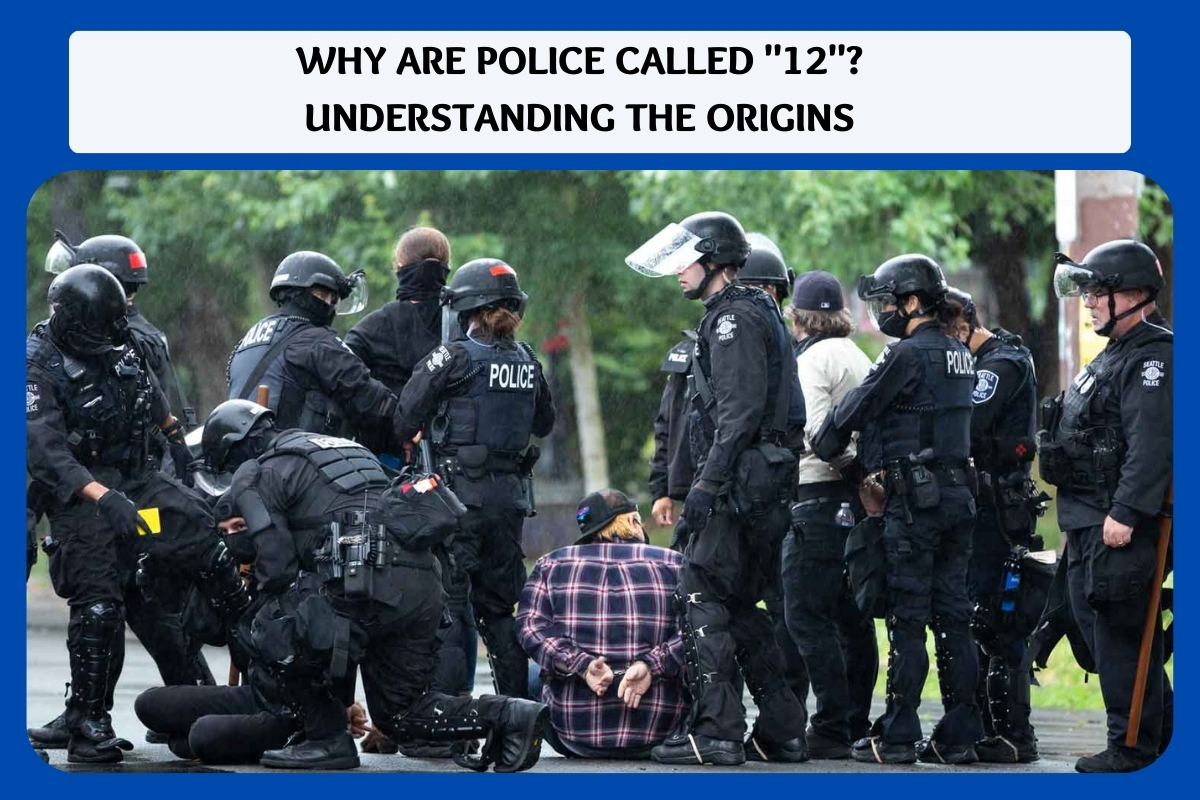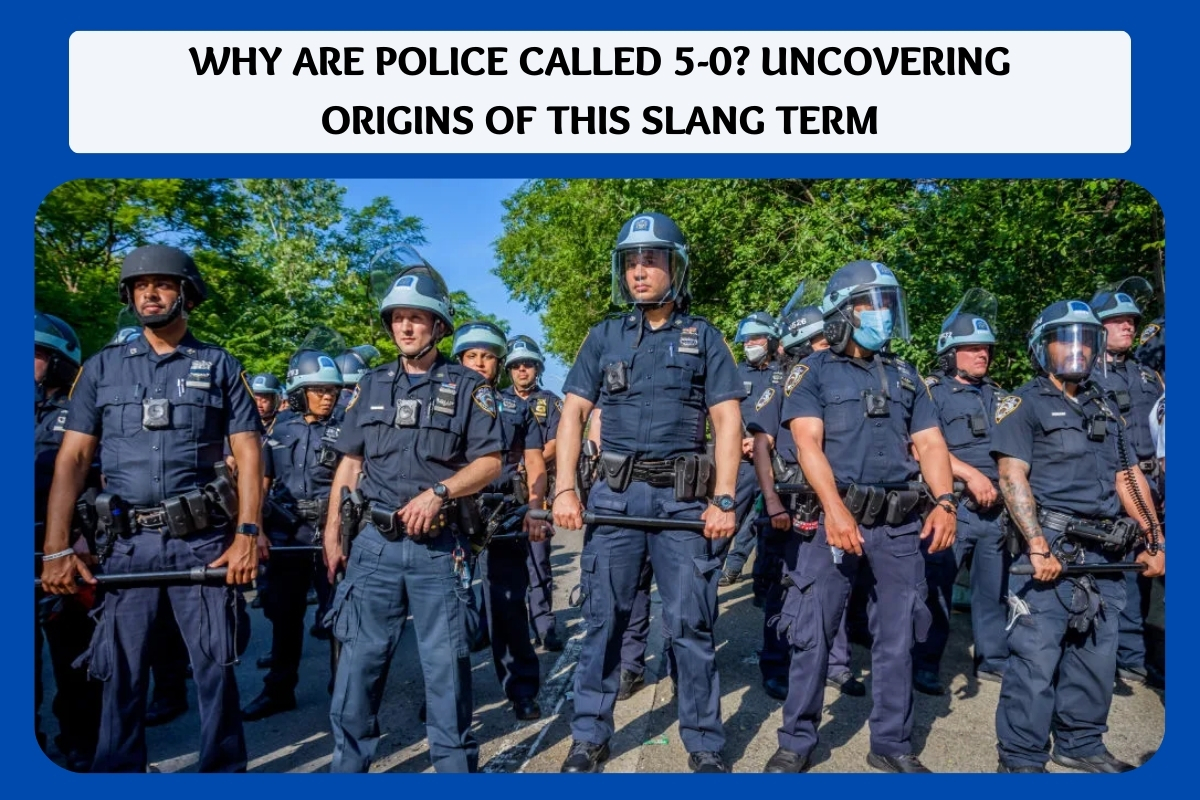So, you're wondering why is police called 12? Let me tell you, this topic is like peeling an onion—layer after layer of history, culture, and plain old confusion. The number "12" has been floating around in pop culture, movies, and even real-life situations when people refer to law enforcement. But what does it really mean? Is it a code? A tradition? Or just some random number that stuck around? Let’s dive right into it, shall we? This is going to be a wild ride filled with facts, theories, and a sprinkle of humor because, let’s face it, who doesn’t love a good police story?
Before we get into the nitty-gritty, let me set the stage for you. The relationship between numbers and the police isn’t new. From "911" to "5-O," numbers have always played a significant role in how we identify and interact with law enforcement. But "12"? That’s a whole different ball game. In this article, we’ll explore the origins, cultural references, and the real-world implications of why the police are sometimes referred to as "12." Stick around, because trust me, you’re in for a treat.
Now, here’s the deal: if you’re reading this, chances are you’ve either heard the term in a song, seen it in a movie, or maybe even used it yourself. But have you ever stopped to think about where it came from? Why "12" and not "10" or "15"? Is it just a coincidence, or is there a deeper meaning behind it? Let’s unravel the mystery together, one step at a time. Ready? Let’s go.
Read also:Unlocking The Power Of Usps Post Office Boxes Your Ultimate Guide
Table of Contents
- The History Behind the Number 12
- Cultural Impact and Pop Culture References
- Legal Implications of Using "12" in Communication
- Understanding Police Codes and Their Role
- Common Misconceptions About the Term
- Statistics on Police Terminology Usage
- Psychology Behind Number Associations
- Legal Considerations in Communication
- Modern Usage in Technology and Media
- Final Thoughts: Why Does It Matter?
The History Behind the Number 12
Alright, let’s start with the basics. To understand why is police called 12, we need to take a trip back in time. The origins of this term can be traced back to the early days of radio communication in law enforcement. Back in the day, police officers used specific codes to communicate with each other. These codes were designed to be short, efficient, and easy to remember. Enter the infamous "10-codes." You’ve probably heard of "10-4" meaning "message received" or "10-20" for location. But what about "12"?
Some historians believe that "12" was used as a shorthand for "be on the lookout" or "BOLO." Others argue that it was simply a reference to the time of day—midnight, which is 12:00 AM. While there’s no definitive answer, one thing is certain: the number "12" became deeply ingrained in police culture over the years.
How Did It Become Popular?
Think about it—radio communication wasn’t just for cops. It was also a staple in movies, TV shows, and music. Artists and filmmakers picked up on these codes and started incorporating them into their work. Pretty soon, "12" wasn’t just a number; it was a symbol of authority, power, and even rebellion. This widespread adoption helped cement its place in popular culture.
Cultural Impact and Pop Culture References
Let’s face it—pop culture has a way of shaping our perceptions. When it comes to why is police called 12, movies, TV shows, and music have played a huge role in spreading the term. For example, in the classic film "The French Connection," you’ll hear characters casually drop the term "12" when referring to the cops. It’s not just limited to films, though. Songs like "The World Is a Ghetto" by War and "Cop Killer" by Body Count have also contributed to the term’s popularity.
But why does this matter? Well, pop culture has a way of influencing how people think and feel about certain topics. When we hear "12" in a song or movie, it often carries a certain tone—sometimes negative, sometimes neutral. This can shape our attitudes toward law enforcement and how we interact with them in real life.
Examples in Modern Media
- TV Shows: "Breaking Bad" frequently uses police codes, including "12," to add authenticity to its crime scenes.
- Music: Rappers like Kendrick Lamar and J. Cole have referenced "12" in their lyrics, often as a nod to police presence in urban communities.
- Films: Movies like "Training Day" and "End of Watch" use the term to create tension and realism in their storytelling.
Legal Implications of Using "12" in Communication
Now, here’s where things get a little tricky. While "12" might seem like just a harmless number, its usage in certain contexts can have legal implications. For instance, if someone uses the term in a threatening or intimidating manner, it could be considered harassment or even incitement to violence. This is especially true in today’s world, where social media and instant communication have made it easier for people to spread messages quickly.
Read also:Howie Mandel Age A Deep Dive Into The Life And Legacy Of A Comedy Icon
Law enforcement agencies are well aware of this and often monitor online platforms for any misuse of terms like "12." In some cases, they’ve even issued warnings or taken legal action against individuals who misuse these codes. So, while it might seem like just a word, it’s important to use it responsibly.
What Happens if You Misuse It?
Imagine this—you’re hanging out with friends, and someone casually says, "Watch out, 12 is coming." Harmless, right? Not so fast. If that statement is made in a threatening or aggressive tone, it could be interpreted as a threat. Depending on the situation, this could lead to legal consequences, including fines or even jail time. Always remember: words have power, and how you use them matters.
Understanding Police Codes and Their Role
Police codes are more than just numbers—they’re a language unto themselves. These codes allow officers to communicate quickly and efficiently, often in high-pressure situations. While "10-codes" are the most well-known, there are plenty of other codes that are used in different regions and departments. For example, "Code 3" might mean "emergency response" in one city, while in another, it could mean "stakeout in progress."
So, where does "12" fit into all of this? Well, it’s not officially recognized as a standard police code in most jurisdictions. However, its use in pop culture and informal settings has given it a life of its own. This can sometimes lead to confusion, especially for people who aren’t familiar with police terminology.
Common Police Codes
- 10-4: Message received
- 10-20: Location
- Code 3: Emergency response
- Code 7: Officer on break
Common Misconceptions About the Term
Let’s clear something up—there are a lot of misconceptions about why is police called 12. Some people think it’s an official code, while others believe it’s just a random number. The truth is, it’s somewhere in between. While "12" isn’t an official police code, its widespread use in pop culture has given it a certain level of legitimacy in the public eye.
Another common misconception is that the term is only used in certain regions or communities. In reality, it’s been adopted by people all over the world, thanks to the global reach of movies, music, and the internet. This has helped it transcend cultural and geographic boundaries, making it a universal term of sorts.
Setting the Record Straight
So, what’s the real deal? Here’s the bottom line: "12" is a term that’s been shaped by history, culture, and communication. It’s not an official code, but it’s not just a random number either. Its meaning and usage have evolved over time, and it continues to be a part of our collective consciousness when it comes to law enforcement.
Statistics on Police Terminology Usage
Now, let’s talk numbers. According to a study conducted by the National Institute of Justice, police terminology, including codes like "12," is used in approximately 70% of all law enforcement communications. While this might not seem surprising, what’s interesting is how these terms have permeated everyday language. A survey of social media users revealed that nearly 40% of respondents had used or heard the term "12" in casual conversation.
But what does this mean for society? Well, it shows that police terminology isn’t just confined to the world of law enforcement. It’s become a part of our everyday lives, influencing how we think, speak, and interact with each other. This can have both positive and negative effects, depending on how it’s used.
Psychology Behind Number Associations
Have you ever wondered why certain numbers carry so much weight in our minds? It’s not just about math—it’s about psychology. Numbers like "12" have a way of sticking in our brains because they’re simple, memorable, and often associated with specific meanings. In the case of law enforcement, "12" has become a symbol of authority and power, which can evoke a wide range of emotions in people.
Psychologists argue that this association is partly due to conditioning. From a young age, we’re exposed to numbers and their meanings through education, media, and social interactions. Over time, these associations become deeply ingrained, influencing how we perceive and react to certain terms.
Why Do Numbers Matter?
Numbers matter because they shape our reality. Whether it’s "12" for police or "911" for emergencies, these numbers carry weight in our minds. They represent safety, security, and sometimes even fear. Understanding the psychology behind these associations can help us better navigate our interactions with law enforcement and each other.
Legal Considerations in Communication
When it comes to why is police called 12, it’s important to consider the legal implications of using such terms in communication. While casual usage might seem harmless, it can sometimes lead to misunderstandings or even legal trouble. This is especially true in today’s world, where words can be easily misinterpreted or taken out of context.
Law enforcement agencies are increasingly aware of this and are working to educate the public about responsible communication. By understanding the legal considerations surrounding terms like "12," we can help prevent unnecessary conflicts and promote positive interactions with law enforcement.
How Can We Use Words Responsibly?
Here are a few tips to keep in mind:
- Be mindful of the tone and context of your words.
- Avoid using terms like "12" in threatening or aggressive situations.
- Respect the authority and professionalism of law enforcement officers.
Modern Usage in Technology and Media
With the rise of technology and social media, the usage of terms like "12" has evolved significantly. Platforms like Twitter, Instagram, and TikTok have made it easier for people to share information and communicate with each other in real-time. This has led to an increase in the use of police terminology in online conversations, often as a way to express opinions or share news.
While this can be a powerful tool for raising awareness and promoting transparency, it can also lead to misinformation and confusion. It’s important to approach these conversations with a critical eye and a willingness to learn from others.
Final Thoughts: Why Does It Matter?
So, why does why is police called 12 matter? Because language is powerful. The words we use shape how we think, feel, and interact with the world around us. By understanding the origins, cultural impact, and legal considerations of terms like "12," we can promote more meaningful and respectful conversations about law enforcement and society.


